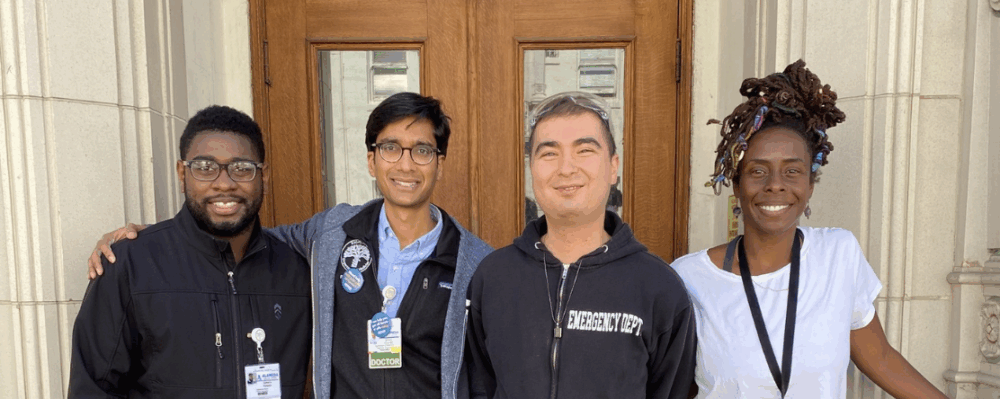
Press Release
New Report Highlights Importance of Supporting Community-Based Organizations and Public Health Departments During COVID and Beyond
-
Focus Areas
Capacity Building & Leadership, Communicable Disease Prevention, Healthy Communities -
Issues
Workforce Development -
Programs
Public Health Alliance of Southern California -
Strategic Initiatives
COVID-19

Years of inadequate funding left our nation’s public health systems ill prepared for the COVID-19 pandemic, but there is also real opportunity to rebuild better, creating a new foundation for lasting, transformative change, community resilience and equity.
A new report, Supporting Communities and Local Public Health Departments During COVID-19 and Beyond: A Roadmap for Equitable and Transformative Change, released today by the Public Health Institute’s Public Health Alliance of Southern California, offers policy, program, and resource recommendations, and best practice examples, ensuring that local public health departments are adequately prepared to protect communities most vulnerable to the health and socioeconomic impacts of COVID-19 as well as future public health emergencies.
READ THE FULL REPORTWhen the pandemic unfolded in early 2020, local health departments were already underfunded to support their core functions. Local health departments had to quickly pivot to addressing the growing threat of COVID-19, and 89% of local health departments who participated in the report’s 2020 survey, stated that funding was a barrier to addressing the response, and a quarter stated it was a major barrier.
The COVID-19 pandemic has caused unreckonable damage and loss for individuals, families, communities, the state and our nation, claiming the lives of over 6.3 million globally, over 1 million in the United States, and over 91,000 in California, and raised renewed concerns about the gap that exists in health status and outcomes (health inequities) for low-income communities and communities of color, and the impact of racism on health, which has existed in these communities for decades.
The historical disinvestment in these communities and systems designed to serve communities, including public health departments and community-based organizations, has made it extremely challenging to be efficient, effective, equitable and timely in responding to the needs of community members and to sustain these efforts.
According to findings from the report’s 2020 local health department survey, over half (59%) of local health department staff reported that they don’t have funded equity staff. Of those, 83% believe additional funding for dedicated equity staff would have better supported their department’s COVID response. Based on the report’s 2020 survey of community-based organizations, 85% indicated that they would most benefit from general operating support in order to make the greatest impact during COVID-19 and other public health and climate emergencies.

“This report serves as a critical resource for government and healthcare agencies, public health departments and community serving groups to be able to effectively plan for long-term recovery from public health emergencies, such as COVID, and to ensure that local public health departments (LHDs) are adequately prepared to protect communities most vulnerable during a public health crisis,” said Tracy Delaney, PhD, the founding executive director of the Public Health Alliance of Southern California.
Some of the recommendations from the report include:
- Significantly increasing funding (especially flexible funding) for public health departments and communities to advance health equity
- Building a resilient and equity-focused public health workforce
- Embedding “equity” in local health department emergency planning, response and recovery processes
- Advancing health equity through community-informed policies and practices
- Building effective partnerships between public health and healthcare
The report serves as a roadmap to help transform systems from a short-term public health crisis  response to longer-term recovery, with equity at the very center. This transformation requires co-visioning and co-creating with community members to ensure that the needs and priorities of communities most disproportionately impacted by inequities are the leading force of these reimagined systems.
response to longer-term recovery, with equity at the very center. This transformation requires co-visioning and co-creating with community members to ensure that the needs and priorities of communities most disproportionately impacted by inequities are the leading force of these reimagined systems.
The report was commissioned by the California Department of Public Health’s Office of Health Equity and includes 68 key informant interviews from across California’s public health, community, healthcare, philanthropy and other sectors, along with more than 100 survey responses; local, regional, and state level public health professional meetings; and a scan and review of policy and best practices.
“Partnerships with [community-based organizations] were essential to the effectiveness of our outreach program so far and supplemented deficits in culturally informed staffing and linguistic challenges for our department staff, explained one of the local health department respondents. Our outreach efforts were effective because of widespread buy-in from the community partners who work closely with vulnerable groups,” they explained.
To access the full report, click here.
More Updates
Work With Us
You change the world. We do the rest. Explore fiscal sponsorship at PHI.
Support Us
Together, we can accelerate our response to public health’s most critical issues.
Find Employment
Begin your career at the Public Health Institute.



